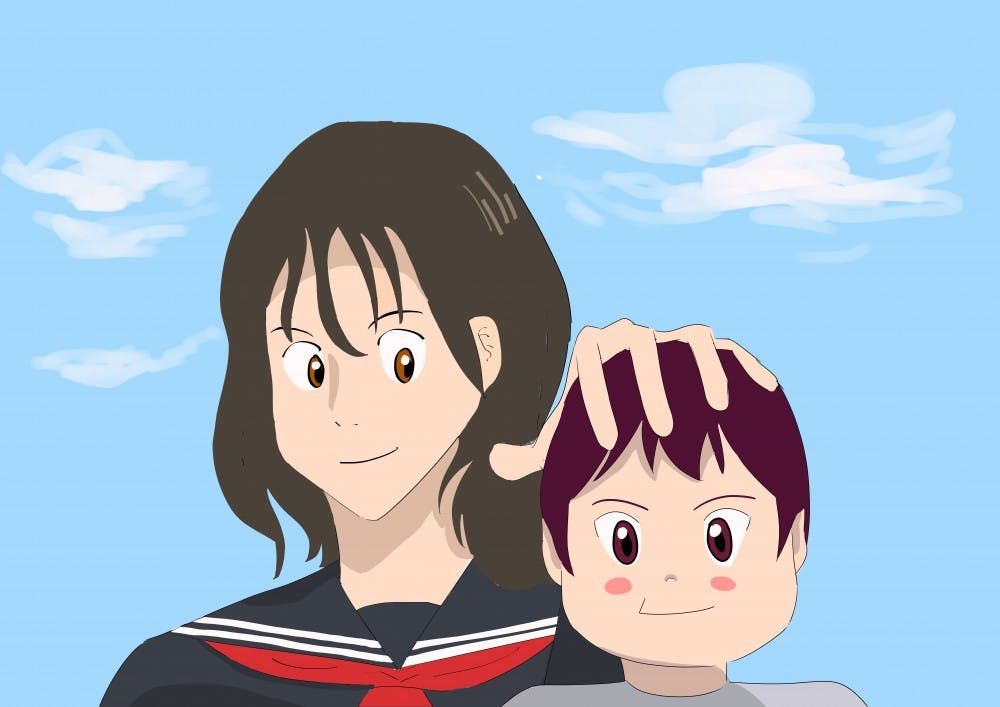Sweet, tender, and adorable: Mirai is a slice–of–life/fantasy tear–jerker (if you’re feeling emotional) that might make you remember being a kid again.
A recent Academy Award nominee for Best Animated Feature, Mirai explores a little boy’s sensitive emotions when his parents bring home his baby sister and give her the attention he originally had all to himself. Bursting with childish innocence, nostalgic warmth, and baby noises, Mirai is a story about a child’s family and his perpetuation of the love that brought it together.
The movie opens with a series of photographs: a couple, a dog, a pregnant woman, and finally Kun, a little boy. From the very start, Mirai embodies the achingly sweet stories that can be expected from Mamoru Hosoda, Mirai’s writer and director. In Summer Wars (2009), Hosoda explored the youthful excitement of summertime, and in Wolf Children (2012), Hosoda tugged at the bittersweet joys of raising children alone. In Mirai, Hosoda finds inspiration again in the family dynamic, but from the eyes of a child.
Kun is the star of Mirai. As he is confronted with new obstacles—his parents won’t give him attention, he’s not as cute as his baby sister, and he’s scared of falling off his new bike—Kun gets transported across time by an oak tree to spend time with and learn from his family. Aligning with the sentiments of childhood imagination, the oak tree’s magic is never explained. It never really needs to be either, because Kun’s straightforward acceptance of the worlds he experiences effortlessly bring the viewer along with him. Animation has come a long way since being perceived as a subgenre of children’s entertainment, but Mirai’s playful jumps through timelines are reminiscent of the confusing worlds I built and consumed for my own entertainment as a child.
While Mirai is absolutely suited for children’s entertainment, it would be inappropriate to label it solely as such. When Kun is transported to meet his mother, now a child, and absolutely wrecks her originally–neat house while playing, the viewer isn’t only given an energetic scene to keep them engaged. Kun sees his mother as he is, young, easily excitable, and messy, and also hears her face the same punishments that he does when her own mother comes home. He understands her better: With every time warp Kun goes through, he grows a little bit and loves his family a little bit more.
On his last time travel, Kun gets lost and is nearly taken to Lonely Island, where children who have nowhere to go live. Amidst his own panic and fear, Kun is only able to save himself when he sees his sister, Mirai, about to also be taken to Lonely Island. Kun tackles Mirai to safety, and afterward he is finally able to say what he’s been denying throughout the entire movie: “I’m Mirai’s big brother!”
After all of Kun’s tears and tantrums, Mirai ends with Kun accepting the lifelong relationship he’ll have with Mirai. For her, Kun makes his ultimate personal sacrifice, his parents’ undivided attention, but he trades it for Mirai’s own affection. The ties in Kun’s family are not only made in blood, but also in the give and take of each other’s unconditional love. And I can’t help but reflect on the same relationship I have with my own family.
On my first day of preschool, I hung onto my own older brother’s hand and cried whenever the teachers tried to take him back to his own class. When I went to summer camp at our local high school, my brother would walk there and back with me every day because I got lost and scared easily, even though he didn’t even go to the camp. And sometime in middle school, my brother dropped his backpack full of textbooks onto me, as I climbed a flight of stairs he stood at the top of.
My brother was my first friend. Valentine’s Day may be traditionally celebrated for romantic love, but it’s also a good time to revisit the other people in your life who have stuck around. Exchanging familial and platonic love is rewarding! With time and distance, I, too, can sometimes forget—but in Kun and Mirai, I’m reminded of the unconditional love that’s always existed for me.







